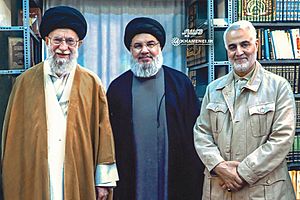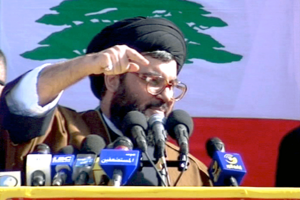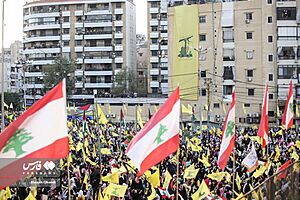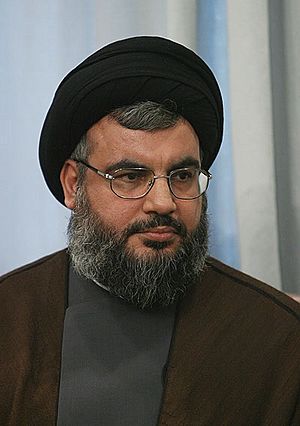Hassan Nasrallah facts for kids
Quick facts for kids
Hassan Nasrallah
|
|
|---|---|
|
حسن نصر الله
|
|
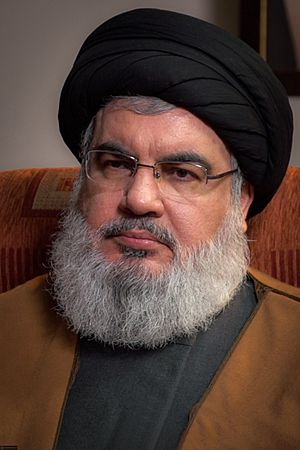
Nasrallah in 2019
|
|
| Secretary-General of Hezbollah | |
| In office 16 February 1992 – 27 September 2024 |
|
| Deputy | Naim Qassem |
| Preceded by | Abbas al-Musawi |
| Personal details | |
| Born | 31 August 1960 Bourj Hammoud, Lebanon |
| Died | 27 September 2024 (aged 64) Dahieh, Lebanon |
| Manner of death | Assassination by airstrike |
| Political party | Hezbollah (1982–2024) |
| Other political affiliations |
Amal (1978–1982) |
| Spouse | Fatimah Yasin |
| Children | 5 |
| Signature |  |
Hassan Nasrallah (Arabic: حسن نصر الله 31 August 1960 – 27 September 2024) was a Lebanese religious leader. He was the leader of Hezbollah, a political group and armed force in Lebanon.
Born in Beirut in 1960, Nasrallah studied in Tyre and later at a religious school in Baalbek. He joined the Amal Movement briefly before becoming part of Hezbollah. Hezbollah was formed to fight against the Israeli invasion of Lebanon in 1982. After studying religion in Iran, Nasrallah became Hezbollah's leader in 1992. This happened after the previous leader, Abbas al-Musawi, was killed by an Israeli airstrike.
Under Nasrallah, Hezbollah gained rockets that could reach northern Israel. After Israel left southern Lebanon in 2000, Hezbollah became very popular. However, Hezbollah's actions before the 2006 Lebanon War faced criticism. During the Syrian civil war, Hezbollah fought alongside the Syrian army. Nasrallah called their opponents "extremists." He also supported the "Axis of Resistance," a group of forces backed by Iran that oppose Israel and the United States. After the attack on Israel by Hamas in October 2023, Nasrallah decided to join the conflict. This led to ongoing fighting between Israel and Hezbollah.
On 27 September 2024, the Israel Defense Forces announced that their air force had attacked Hezbollah's main office. Their goal was to kill Nasrallah. Hezbollah confirmed his death the next day.
Contents
Early Life and Learning
Hassan Nasrallah was born on 31 August 1960, in Bourj Hammoud, a suburb of Beirut. He was the ninth of ten children in a Shia family. His father, Abdul Karim Nasrallah, sold fruits and vegetables. The family was not very religious, but Hassan was interested in studying religion. He went to al-Najah school and then a public school.
In 1975, the Lebanese Civil War started. Nasrallah, who was 15, and his family moved to their old family home in Bazourieh. He finished high school in Tyre. There, he briefly joined the Amal Movement, a Shia political group in Lebanon.
Nasrallah then studied at a Shia religious school in Baalbek. This school followed the teachings of Mohammad Baqir al-Sadr, a scholar from Iraq.
In 1976, at age sixteen, Nasrallah went to Iraq to study at al-Sadr's school in Najaf. Al-Sadr saw leadership qualities in Nasrallah. In 1978, Nasrallah and many other Lebanese students were forced to leave Iraq. Al-Sadr was later arrested and killed. Nasrallah returned to Lebanon in 1979.
Back in Lebanon, Nasrallah studied and taught at a school run by Abbas al-Musawi, who was a leader of the Amal Movement. Nasrallah was later chosen as Amal's political representative in Beqaa. This made him a member of their main political office.
Early Activities
Nasrallah joined Hezbollah after the Israeli invasion of Lebanon in 1982. In 1989, he traveled to Qom, Iran, to continue his religious studies.
Nasrallah believed that Islam could solve society's problems. He once said that Islam is "a divine message that was designed for humanity." He felt it could answer any question about human life.
In 1991, Nasrallah returned to Lebanon. The next year, he became Hezbollah's leader. He took over after Musawi was killed by an Israeli airstrike.
Leading Hezbollah
Nasrallah became the leader of Hezbollah in 1992 after the previous leader, Musawi, was killed by Israel. Under Nasrallah, Hezbollah gained rockets that could reach northern Israel. This was important because Israel occupied southern Lebanon at the time. In 1993, Israel launched "Operation Accountability," which damaged much of Lebanon's buildings and roads. An agreement was reached where Israel stopped its attacks, and Hezbollah agreed to stop attacks on northern Israel.
However, the peace did not last long. In 1996, Israel launched "Operation Grapes of Wrath." This operation blocked Lebanese ports and bombed a Syrian military base. After 16 days, a ceasefire was agreed upon. Again, Hezbollah agreed to stop rocket attacks if Israel stopped its attacks. But this peace also did not last.
In Israel, there was a debate about whether keeping forces in southern Lebanon was working. It was clear that Hezbollah's rockets could still reach Israel. After many Israeli soldiers were hurt, some politicians argued that the conflict would only end if Israel left Lebanon. In 2000, Ehud Barak pulled Israeli forces out of Lebanon. After Israel left, the South Lebanon Army, which Israel supported, was quickly defeated by Hezbollah. Many of its members were captured. This success against Israel made Hezbollah very popular in Lebanon and the wider Islamic world.
Because of this, Nasrallah was seen as a hero in Lebanon and the Arab world. People gave him credit for ending the Israeli occupation of southern Lebanon. This greatly increased Hezbollah's political power in Lebanon.
Nasrallah also played a big part in a prisoner exchange deal in 2004. Hundreds of Palestinian and Lebanese prisoners were freed. The remains of many people, including Nasrallah's son, were returned to Lebanon. This agreement was seen as a great victory for Hezbollah in the Arab world. Nasrallah was praised for making it happen.
Hezbollah has been called a "terrorist organization" by the United States and other countries, as well as by the European Union. However, some countries like Russia and China have different views. Russia does not see Hezbollah as a terrorist group and considers it a legal social and political organization. China remains neutral and keeps in touch with Hezbollah.
Key Events and Conflicts
The 2006 Lebanon War
The 2006 Lebanon War began after Hezbollah attacked an Israeli border patrol, killing three soldiers and capturing two. During the war, Israeli bombings aimed at Hezbollah targets caused damage in many parts of Beirut. This included the poorer, mostly Shia areas of South Beirut, which Hezbollah controls. On 3 August 2006, Hassan Nasrallah promised to attack Tel Aviv if Israel continued bombing Lebanon's capital. He said, "If you hit Beirut, the Islamic resistance will hit Tel Aviv."
During this conflict, Nasrallah faced strong criticism from some Arab countries, like Jordan, Egypt, and Saudi Arabia. They warned that Hezbollah's actions could pull the region into dangerous situations. Some people in Lebanon also criticized Nasrallah. Walid Jumblatt, a leader of the Druze community, said, "He is willing to let the Lebanese capital burn while he argues over terms of surrender."
After the war, Hezbollah distributed large amounts of money to people whose homes were damaged. This money, reportedly from Iran, helped many citizens in Beirut and the south.
In an interview on 27 August 2006, Nasrallah said he would not have ordered the capture of the two Israeli soldiers if he had known it would lead to such a big war. He believed the war was planned and the capture was just an excuse.
Role in the Syrian Civil War
On 25 May 2013, Nasrallah announced that Hezbollah was fighting in the Syrian civil war. He said they were fighting against "Islamist extremists." He promised that his group would not let Syrian fighters control areas near Lebanon. He confirmed that Hezbollah was fighting in the important Syrian town of Qusair alongside the Syrian army. He stated that if Syria fell to forces backed by America and Israel, the region would face a "dark period."
In July 2014, Nasrallah's nephew was killed while fighting in Syria.
Family Life
Nasrallah was married to Fatimah Yasin. They had five children: Muhammad Javed, Zainab, Muhammad Ali, Muhammad Mahdi, and one other.
On 27 September 2024, his daughter Zainab was killed by an Israeli airstrike.
His Passing
On 27 September 2024, the Israeli Air Force launched an airstrike on the Hezbollah headquarters in Beirut. Reports said they were targeting Nasrallah. At least six people died and over 90 were injured in the attack.
On the morning of 28 September 2024, the IDF announced that Nasrallah had died in the strike. Hours later, Hezbollah and Lebanese officials confirmed his death.
What People Remember
By helping end the Israeli occupation, Nasrallah became a "national hero" in Lebanon. The New York Times reported that an Arab politician called him the "most powerful man in the Middle East." This politician also said Nasrallah was "the only Arab leader who actually does what he says he's going to do." Al Jazeera compared him to other Arab leaders like Yasser Arafat and Gamal Abdel Nasser. Journalist Annia Ciezadlo described him as a symbol of "Islam and Arab pride."
Nasrallah was often called "al-Sayyid Hassan" (السيد حسن). The title "Sayyid" means he claimed to be a descendant of the Islamic prophet Muhammad.
See Also
 In Spanish: Hasan Nasrallah para niños
In Spanish: Hasan Nasrallah para niños
- Iran–Lebanon relations
- Bashar Assad
- Ali Khamenei
 | James Van Der Zee |
 | Alma Thomas |
 | Ellis Wilson |
 | Margaret Taylor-Burroughs |


